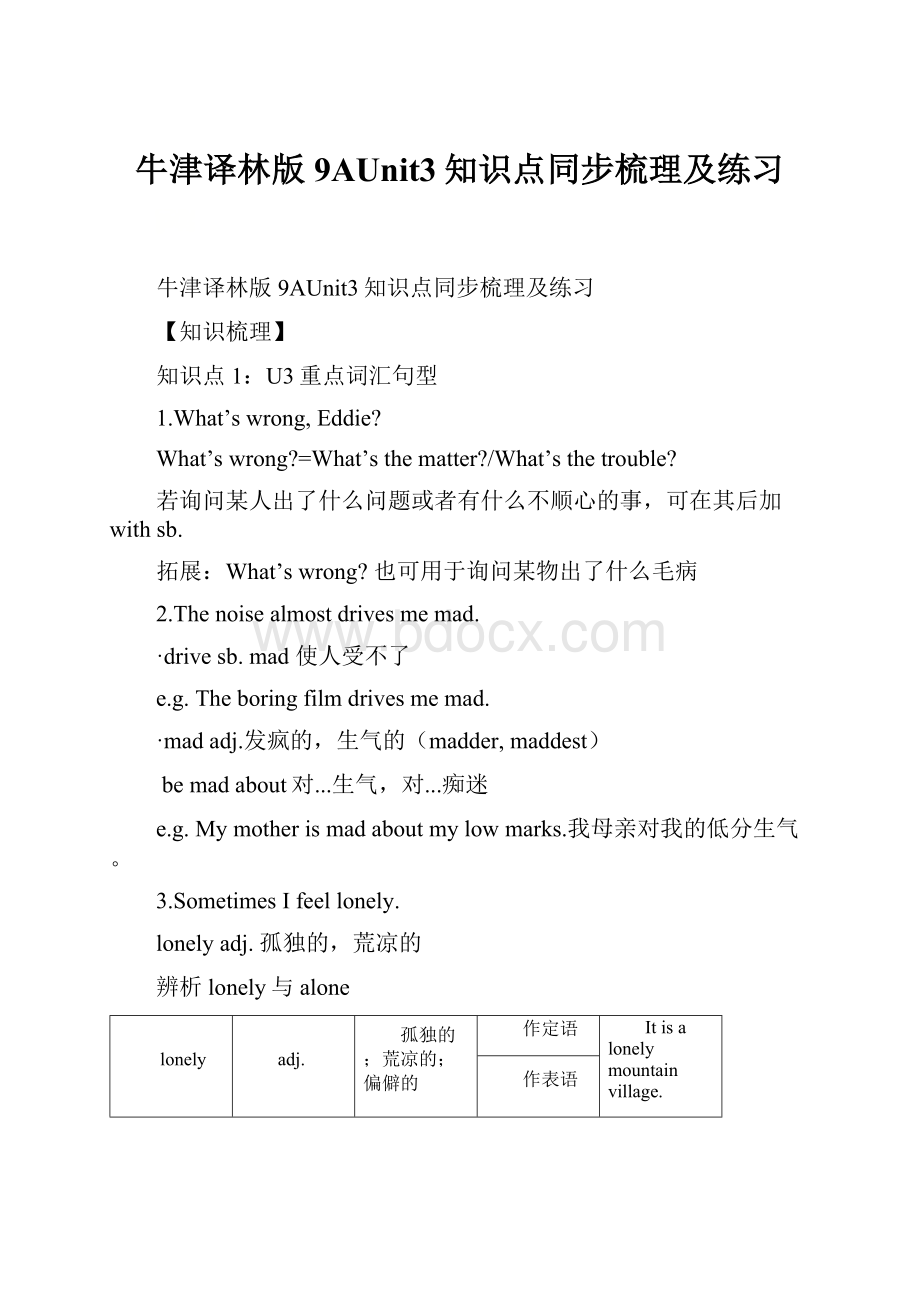牛津译林版9AUnit3知识点同步梳理及练习Word文档格式.docx
《牛津译林版9AUnit3知识点同步梳理及练习Word文档格式.docx》由会员分享,可在线阅读,更多相关《牛津译林版9AUnit3知识点同步梳理及练习Word文档格式.docx(17页珍藏版)》请在冰豆网上搜索。

单独的;
独立的
作表语,不能用作定语
Theoldmanwasalone.
这个老人独身一人
MrSmithlivesalone.
史密斯先生自己住
adv.
作状语
4.SometimesIfeelsleepyinclass.
sometimes与attimes同义
辨析:
sometimes,sometimes;
sometime与sometime
sometimes
有时
Sometimesshehaslunchatschool.
sometimes
几次;
几倍
I’vebeentothemuseumsometimes.
sometime
某时
I’llvisitDamingsometimethissummervacation.
sometime
一段时间
Shehaslivedhereforsometime.
5.Perhapsyoushouldmanageyourtimebetterandgotobedearlier.
perhapsadv.,或许,可能
e.g.Perhapsitwillrain.
managev.合理安排,有效利用(金钱、时间等)
e.g.Youneedtolearntomanageyourtime.你需要合理安排你的时间
manage控制,管理
e.g.Asaheadteacher,hemanagesaschool.作为一名校长,他管理一所学校
managetodosth.设法做成某事,努力完成某事
e.g.Hemanagestofindaplacetoparkhiscar.他设法找到了一个停车的地方
6.IdonotknowhowIshoulddealwithit.
dealwith处理,对付
dealwith和dowith
dealwith
处理,对付
常与how连用
dowith
处理
常与what连用
howtodealwithsth与whattodowithsth
7.Ihavenochoicebuttodoit.
havenochoicebuttodosth.别无选择,只能做某事=candonothingbutdosth
but,except与besides
but
除...之外,只有
but后的词是仅有或存在的内容,通常与no,nothing,nobody等表示否定的词连用。
但当but前有实义v.do时,but后的不定式需省去to
except
除...之外(不再有)
指从整体排除except后的人或物,常与all,everybody,everything连用
besides
除了...之外(还有)
是指在原来的基础上加上besides除外的人或物
e.g.:
LastnightIdidnothingbutwatchTV.
WeallwenttothecinemaexceptTom.Hewasill.除了汤姆,我们都去电影院了。
他生病了。
Amyhasanothertwogoodfriendsbesidesyou.除了你之外,埃米还有另外两个好朋友。
8.ThenIsometimesfindithardtostayawakethenextday.
awakeadj.睡着的(只能在句中作表语)
e.g.Isheawakeorasleep?
Ihopehe’sawakenow.我希望他现在醒着。
awake与wake
awake
醒着的
用在连系v.后作表语(不能作定语)
wake
v.
睡醒,醒来
常与up连用,wakeup唤醒,代词作宾语时要放在wakeup中间
9.However,Ihardlyhaveanysparetimeformyhobbieslikevolleyballandmusic.
hardlyadv.几乎不,相当于almostnot
e.g.Ihardlyateanythinglastnight.我昨天晚上几乎什么也没吃
spareadj.“空闲的”havesparetimeforsth.
v.“抽空”sparesometimetodosth.
10.Ioftendoubtwhetheritisworthspendingsomuchtimeonhomework.
1)doubtvt.怀疑
在肯定句中,doubt一般后接whether或if引导的宾语从句,doubt后也可接that引导的宾语从句,但表示疑虑较大或“不相信”。
在疑问句和否定句中,doubt后接that引导的宾语从句。
e.g.IdoubtwhetherI’llbesuccessful.
Idon’tdoubtthathe’llcome.
doubtn.疑问,怀疑
doubtfuladj.不确定的,怀疑的
2)beworthdoingsth.值得做某事
worthadj.值得,在句中作表语。
worth还有值...钱的意思。
e.g.Thecameraisworthsevenhundreddollars.
Themusiciswellworthlisteningto.
【反义词】worthless无用的,没有价值的
11.ThenIgetintotroublebecausemyparentsdonotallowmetoplayoutsideafter6pm.
1)getintotrouble陷入麻烦中
2)allowsb.todosth.允许某人做某事
allowdoingsth.允许做某事
e.g.Hisparentswon'
tallowhimtostayoutlate.他的父母不会允许他在外待得很晚。
ThechildrenarenotallowedtowatchviolentTVprogrammes.儿童不准收看含暴力内容的电视节目。
Schoolsdon'
tallowsmoking.学校不允许抽烟。
12.Ineedsomeonetosharemyworrieswith.
1)worryn.,意为“担心;
令人担忧的事情”,其复数形式为worries。
Toomanyworriesarebadforyourhealth.太多的忧虑对你的健康有害。
2)worryvt.意为“使烦恼”,“使焦虑”,常接sb作宾语。
Whatworriedyousomuch?
什么事使你这么着急?
3)worryvi.意为“烦恼”、“担心”、“发愁”,常跟介词about或over。
Theyareworryingaboutthecomingexam.他们正在为即将到来的考试而发愁。
4)worry后接从句时,也表示“为……担心”
Don'
tworryhowmuchyou'
spend.别担心花多少钱。
13.HowaboutreadingEnglishaloudeverymorning?
aloudadv.大声地;
出声地。
[辨析]aloud和loudly
1)aloud作“出声地”含义时,主要与read,think等连用,表示声音可以被听到。
作“大声地”含义时,主要与shout,call,cry等词连用。
e.g.Hereadherletteraloudtotherestofthefamily.他把她的信大声读给家人听。
Thelittleboyiscryingaloud.那个小男孩哭的很厉害。
2)loudlyadv.“响亮地、大声的”,含有“喧闹”或者“嘈杂”的含义。
Someoneknockedloudlyatthedoor.有人大声敲门。
14.Youareunhappywithyourweight,butyoudonotknowhowtochangeit.你对于自己的体重不满意,但是你不知道怎样改变它。
unhappy为形容词,意为“不快乐的;
不满的”。
它是由happy加否定前缀un变化而来的。
Icouldnolongerignorethefactthathewasdeeplyunhappy.
我再不能对他深感不快这个事实不闻不问了。
[归纳]加前缀un:
un-前缀很灵活,它可以加在形容词、过去分词、现代分词前面构成具有否定意义的形容词:
able(adj.能够……的)-unable(adj.不能够……的)
comfortable(adj.舒服的)-uncomfortable(adj.不舒服的)
acceptable(adj.可接受的)-unacceptable(adj.难以接受的)
doubted(adj.怀疑的)-undoubted(adj.无疑的)
15.Perhapsyoushouldgooverwhatyou’velearntasoftenaspossible.
goover复习,回顾,仔细检查
e.g.Itwillbewisetogoovertestpaperagain.
【拓展】与go有关的短语
goon(doing/todosth)继续做某事gothrough仔细查看,浏览,翻阅,通过
goahead向前,干吧,说吧,用吧goaway走开goagainst反对,违背
【课堂练习】
检测题:
用所给词的适当形式填空
1.Thelittlegirlhadno_______(choose)buttoaskforhermother'
shelp.
2.MrLigaveusa_______(value)reportyesterday.
3.Ioftendoubtwhetherthefilmisworth._______(see)again.
4.SometimesmyfriendsandIforgetwhenweneed_______(stop).
5.Canyouoffermesome_______(suggest)?
7.I'
mlookingforwardto_______(have)alongholiday.
8.Theywillbeofsome_______(value)tome.
9.Mysoniscrazyabout_______(play)basketball.
10.IhopeIcangetmy_______(parent)support.
11.Doinghobbiescanmakeourlives_______(interest).
12._______(plan)yourdaycarefullyandyouwilldoitbetter.
答案:
1.choice2.valuable3.seeing4.tostop5.Suggestions6.having7.value8.playing9.parents'
10.interesting11.Plan
知识点2:
U3重点语法
A疑问词引导的宾语从句
A.语序:
无论主句是陈述句还是疑问句,宾语从句都必须使用陈述语序,即“主句+连词+宾语从句(主语+谓语+……)”句式。
根据连接词在从句中所担任的不同成分,可分为以下四种:
(1)连接词+谓语。
连接词在从句中作主语。
常见的连接词有:
who,what,which等
e.g.Thesmallchildrendon'
tknowwhatisintheirstockings.这些小孩子不知道袜子里有什么东西?
(2)连接词+名词+谓语。
连接词在从句中作主语的定语。
whose,what,which,howmany,howmuch等
e.g.Heaskedwhosehandwritingwasthebestinourclass.他问我们班上谁的书法最好。
(3)连接词+主语+谓语。
连接词在从句中作宾语、状语或表语。
who(m),what,which,howmany,howmuch,when,why,how,where等
e.g.Hehasn'
tdecidedwhenhe'
llgoonatriptoWuxi.他还没决定什么时候去无锡旅行。
(4)连接词+名词+主语+谓语。
连接词在从句中作宾语或表语的定语。
what,which,howmany,howmuch,how等。
e.g.Sheaskedmewhatcolourmypenwas.她问我的钢笔是什么颜色。
【友情提醒】在选择宾语从句时,首先应该注意从句的句式是否正确。
B.时态:
与第二单元涉及的宾语从句的时态,用法相同,省略讲解。
B提建议的方法
1.Whynot-和Whydon'
tyou-
“Whynot+动词原形+其他?
”意为一“为什么不……呢?
”
Whynothaveatry?
=Whydon'
tyouhaveatry?
为什么不试一试呢?
2.Whatabout和Howabout
What/Howabout+名词/代词/动词的-ing形式+其他?
此句型意为“……怎么样?
Whataboutgoingto8movie?
去看场电影怎么样?
3.Let'
s+动词原形+其他。
此句型意为“(让)我们……吧”。
其否定形式直接在let后加not。
Let'
sgotothewaterpark.让我们去水上公园吧。
4.Shallwe/I+动词原形+其他?
此句型意为“我们/我做……好吗?
”,常以商量的语气向对方提出建议。
Whatasunnyday!
Shallwegohiking?
天气多好呀!
我们去远足好吗?
5.Wouldyoumind+动词的-ing形式+其他?
这是英语中用来提建议或要求的常用句型,意为“请你做……好吗?
Wouldyoumindclosingthewindow?
请你关上窗户好吗?
6.Couldyouplease+动词原形+其他?
此句型意为“请你……好吗?
”其中could并不是can的过去式,而是表示更委婉的建议或请求。
Couldyoupleasewashthedishes?
请你洗盘子好吗?
【友情提醒】当对方向你提出建议时,肯定回答可用OK!
/Good./Goodidea!
/Thatsoundsgood./Sure./Ofcourse./Yes,please./Yes,Ithinkso./Yes,I'
dloveto./Allright./Noproblem./Iagreewithyou.等。
否定回答可用No,thanks./No,Idon'
tthinkso./No,I'
mbusy./Idon'
tagree./Sorry,I'
mafraidnot.等。
【例题精讲】
()1.-Thelightinhisroomisstillon.Doyouknow_______?
-Maybedeepintothenightagain.
A.whyishesobusyB.ifheworkshard
C.whyhestaysupsolateD.whenhewillstopworking
()2.-Doyouknow_______forShanghailastnight?
-At9:
00.
A.whattimeheleavesB.whattimedoesheleave
C.whattimeheleftD.whattimedidheleave
()3.Heaskshisfather_______.
A.whereithappensB.wheredoesithappen
C.howithappenedD.howdoesithappen
()4.Thenewly-designedcarisontheshownow.Iwonder_______.
A.howmuchdoesitcostB.whodesignedit
C.wherewasitmadeD.thatthecarwillbesoldinChina
()5.HealwaysgivesmeusefuladvicewhenIdon'
tknow_______.
A.whototalkB.whototalkto
C.whowillItalktoD.whoshouldItalkwith
()6.Youseem_______.Whatareyou_______?
A.worries;
worryingaboutB.worry;
worriedabout
C.worried;
worryingaboutD.worried;
worryabout
DCCBBC
1.Couldyoutellmethebikewithoutanyhelpthismorning?
A.howdoeshemendB.howhemends
C.howhemendedD.howdidhemend
2.Couldyoutellme?
A.whichschoolyouareinB.whichschoolareyouin
C.youareinwhichschoolD.whichschoolyouare
3.Jimdoesn'
tunderstand.
A.whichisthewaytothemuseumB.whyhiswifealwaysgoesshopping
C.whatisthewaytothemuseumD.whydoesshealwaysgoshopping
4.—Couldyoutellmesheislookingfor?
A.thatB.whoseC.whoD.which
5.Mr.Kingdidn'
tknowyesterdayevening.
A.whendoeshissoncomehomeB.whenhissoncomeshome
C.whendidhissoncomehomeD.whenhissoncamehome
6.Couldyoutellmethebikethismorning?
7.—I’mwaitingforthemail.Doyouknowitwillarrive?
—Usuallyitcomesby4:
00.
A.howB.whereC.whenD.what
8.—Excuseme,wouldyoupleasetellme_____________?
—Certainly.Gostraightalonghere.It'
snexttoahospital.
A.howwecangettothepostofficeB.howdanwegettothepostoffice
C.howgettothepostofficeD.howcouldwegettothepostoffice
9.—CanIhelpyou?
—Yes.I'
dlikeatickettoMountEmei.Canyoutellme______________taketogetthere?
A.howsoonwillitB.howsoonitwill
C.howlongitwillD.howlongwillit
10.Hewantedtoknow.
A.whetherhespeaksatthemeetingB.whenthemeetingwoulds